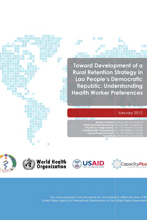
New Publication Spotlight: Interview with Wanda Jaskiewicz on Toward Development of a Rural Retention Strategy in Lao People’s Democratic Republic
As in many countries, Lao People’s Democratic Republic (PDR) faces challenges in attracting and retaining health workers to serve in rural and remote areas. A new technical report from CapacityPlus details the application of the project’s rapid retention survey toolkit to estimate which incentives Laotian health workers and health professional students would most prefer in deciding whether to accept or remain in a rural posting. The report, Toward Development of a Rural Retention Strategy in Lao People’s Democratic Republic: Understanding Health Worker Preferences, suggests that specific interventions, if implemented appropriately, would likely increase the number of doctors, medical assistants, and nurses/midwives willing to work in rural settings. While salary was an important factor for both health workers and students, the survey found that when a bundle of other highly valued incentives was offered, such as career promotion and study opportunities, salary became less of an issue. This finding is consistent with other recent literature, which contends that increasing salary alone is not enough to motivate health workers to stay in rural areas.
The report, Toward Development of a Rural Retention Strategy in Lao People’s Democratic Republic: Understanding Health Worker Preferences, suggests that specific interventions, if implemented appropriately, would likely increase the number of doctors, medical assistants, and nurses/midwives willing to work in rural settings. While salary was an important factor for both health workers and students, the survey found that when a bundle of other highly valued incentives was offered, such as career promotion and study opportunities, salary became less of an issue. This finding is consistent with other recent literature, which contends that increasing salary alone is not enough to motivate health workers to stay in rural areas. CapacityPlus’s Wanda Jaskiewicz coauthored the report with colleagues from the Lao PDR Ministry of Health and the World Health Organization. While the primary audience for the report is Laotian human resources for health stakeholders and policy-makers, Jaskiewicz hopes other countries and organizations will find it useful as an example of how the rapid retention survey toolkit can be applied. The Ministry of Health also used iHRIS Retain, the retention intervention costing tool developed by CapacityPlus in collaboration with the World Health Organization, to gauge the financial feasibility of the preferred incentive packages. Together, the survey results and costing data will constitute key inputs in developing a rural retention strategy and policies.
CapacityPlus’s Wanda Jaskiewicz coauthored the report with colleagues from the Lao PDR Ministry of Health and the World Health Organization. While the primary audience for the report is Laotian human resources for health stakeholders and policy-makers, Jaskiewicz hopes other countries and organizations will find it useful as an example of how the rapid retention survey toolkit can be applied. The Ministry of Health also used iHRIS Retain, the retention intervention costing tool developed by CapacityPlus in collaboration with the World Health Organization, to gauge the financial feasibility of the preferred incentive packages. Together, the survey results and costing data will constitute key inputs in developing a rural retention strategy and policies.
The experience in Lao PDR also significantly influenced the further development of the rapid retention survey toolkit, which began with an application in Uganda. As Jaskiewicz notes, “You can’t produce an effective tool without actually trying it out with its intended users to see how the steps and processes are operationalized during application.” Working closely with Laotian colleagues as they implemented the survey resulted in numerous improvements to the toolkit, which CapacityPlus plans to publish later this year.
Related items:
Photo courtesy of Wanda Jaskiewicz.


